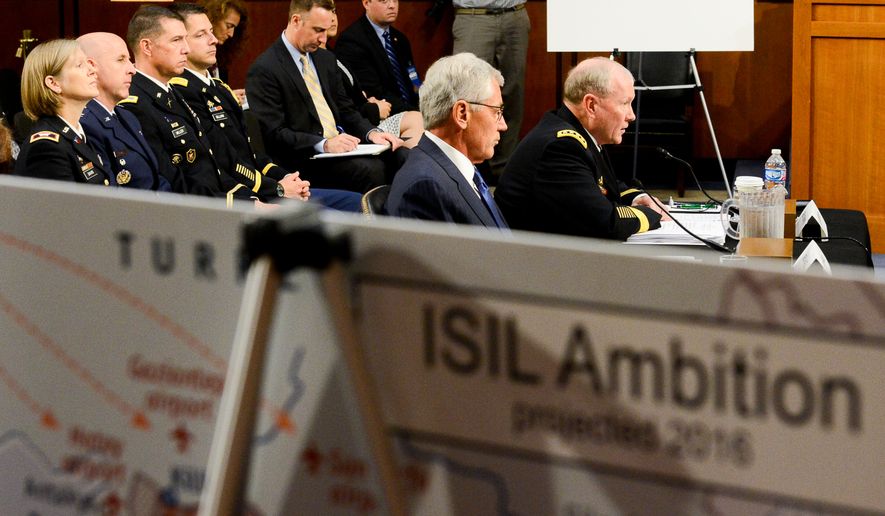Islamic State militants may now be engaged in a competition with al Qaeda to be the successors to Osama bin Laden’s terrorist empire, with disastrous implications for Americans’ safety, top security officials said Wednesday.
“You’re not going to be the leader in the global jihad without striking America,” FBI Director James B. Comey told the House Homeland Security Committee.
Though born as al Qaeda’s Iraq branch, the Islamic State, also known by the acronyms ISIS or ISIL, has split and is now on the ascendance, buoyed by its recent battlefield successes — and the U.S. officials said that’s sparked some envy, which is dangerous for all.
Homeland Security Secretary Jeh Johnson said the two organizations are competing for recruits, funding and attention, which means they are trying to prove they are the most capable of carrying out their missions.
Matthew G. Olsen, director of the National Counterterrorism Center, said there’s already some concrete evidence of the feud. He said a recent announcement by al Qaeda that they’ve added a new affiliate in Southeast Asia “could be viewed as an effort by core al Qaeda to reassert its supremacy in this global movement.”
Bill Roggio, managing editor of the Long War Journal, a project of the Foundation for the Defense of Democracies, said the Islamic State and al Qaeda share the same ideological goals — global jihad and establishing a caliphate. He said that’s not surprising, given that the Islamic State was spawned out of al Qaeda in Iraq.
SEE ALSO: Obama tells troops no ground war in Iraq
The split came when the Islamic State took a more forceful role in Syria.
Ayman al-Zawahri, the head of al Qaeda now that bin Laden is dead, has tried to patch things up, asking Abu Bakr al-Baghdadi, chief of the Islamic State, to leave Syria and focus on fighting in Iraq.
But the Islamic State leader has refused.
Mr. Roggio said there are some differences between the organizations. Al Qaeda is more open to having differentiated branches, while the Islamic State wants its troops fighting under its own banner. The Islamic State is also better organized and has better fighters.
But both organizations engage in selling oil, kidnapping for ransom, and collecting taxes or fees for services from those who live in the territory they control.
And while much attention has been given to the Islamic State’s occupation of large chunks of territory in Iraq and Syria, al Qaeda has held territory in Yemen and Somalia.
The Islamic State is better at using social media, which could be winning the battle for new recruits. But Mr. Roggio also said the Islamic State could be growing quickly because Iraq and Syria are easier to get to than Afghanistan and Pakistan, where al Qaeda thrived.
“They seem to be getting an inordinate number of foreign recruits — guys with Western passports,” Mr. Roggio said.
Mr. Olsen, testifying to Congress on Wednesday, said U.S. intelligence now estimates the Islamic State has between 20,000 and 31,500 fighters, which is up to three times the estimate of just a few weeks earlier.
He said the new estimate is a result of both better assessments and a surge in recruitment.
More than 2,000 Europeans and more than 100 Americans have gone to Syria to join the fight, and many of those have joined on the side of the Islamic State.
Rep. Michael T. McCaul, Texas Republican and chairman of the House Homeland Security Committee, said the two organizations now appear to be in a competition “to see who is the true heir-apparent to bin Laden.”
He said the Islamic State’s ability to attract Westerners poses a major danger in that it might be easy for one of them to travel to the U.S. to conduct a mission here.
• Stephen Dinan can be reached at sdinan@washingtontimes.com.




Please read our comment policy before commenting.